![]()
Why should the poor always have to pay for the misdeeds of the government, of the rich?
This question surfaced yet again when I stood outside Rangs building on the morning of Dec 12.
Rangs, one of the largest business houses in Bangladesh, had their building plans approved by Rajuk (Rajdhani Unnoyon Kortripokkho, i.e., Capital Development Authority), and they built a huge edifice. Approval for high rises are generally not given in this area due to flight restrictions. Six storied buildings are the limit. However, Rangs built a 22 storied building which no one could miss. Except Rajuk, of course.
That is how things stood until the present caretaker government came into power and rushed headlong into its drive against corruption.
? Which officials in Rajuk had okayed these plans? And why? That has remained a secret. Has anyone in Rajuk been punished for approving these plans?
? The Supreme Court ordered the demolition of the building, and Rajuk appointed Six Star, a ship-breaking company to carry out the work. Who made the decision? On what basis? What qualifications did Six Star have? Was any corruption involved? If so, will those involved be tried?
? After the demolition disaster, Six Star, Rajuk, Rangs — will they be made accountable for their misdeeds?
Is a life worth only one lakh taka — the sum that the government will pay as compensation for those who have died?
‘They don’t give us our dead’
An elderly man sat 50 feet away from the Rangs building on a second floor veranda of a shopping market. After the innards of the building had collapsed, many workers had taken shelter in this veranda. The elderly man had come to Dhaka early this morning with his son-in-law, in search of his son’s body. He muttered something when I asked him if he had spoken to anyone here. I couldn’t make sense, and repeated my question. I could barely make out what he said, “They don’t give us our dead.” He told me he had come from Gaibandha, and I thought to myself, now we can be sure that one of those who have died is from Gaibandha.
A woman has rushed over from Modhukhali. Her brother has suffered a head injury. But thankfully, he is alive, and he will live. At least ten people from Modhukhali are thought to have died in the demolition disaster.
Hajari, one of the workers hired for demolition said, one of the building’s security men is missing. He had last been seen on one of the topmost floors of the building. “It all happened in less than 30 seconds.” Hajari and the other workers had scrambled down the floors to save themselves.
I spoke to some of the workers and it seemed that no one from Rajuk or Six Star, at least not any one in a position of authority had contacted them, or spoken to them, let alone reassured them. Class distances are such that the workers themselves had not gathered the courage to talk to Rajuk officials.
Six Star company, Hajari told me, had brought the main group of workers from Chittagong. Being a port city, Chittagong is a place where people from different parts of the country migrate to in search of work. Hajari’s home is Barisal but he has lived for many years in Chitagong. “Six Star,” he said, “they will provide compensation. They are ever-ready. In Chittagong dock, every month you get to see one or two workers die, such accidents keep happening.” Most of those who had survived the Rangs disaster had been sent back by Six Star. Only 50 workers had been kept back for the rescue effort.
Six Star was paying the workers daily wages and also providing meal charges. From tonight (Dec 12) , the company would also arrange workers’ boarding. This is what Hajari had told me but when I spoke to two other workers, they said they were not being paid their regular wages. Neither were labour shordars giving them money to buy food.
On the market verandah I came across another worker, who was released yesterday from Dhaka Medical College. He had received back injuries, so said the hospital slip. He did not have the money to buy the medicine that had been prescribed. Painkillers on an empty stomach would do him more harm than good. He told me that he had slept on a thin sheet of cloth the night before, and that his pain had increased.
An old story of anguish and suffering
As we talked with the workers and their relatives, I noticed an elderly, bearded man speaking nearby. He was noticeably agitated. I took him to be a demolition worker. I moved closer to where he stood and heard him say, “If they had been the sons of MPs and Ministers, would the dead bodies have been left hanging? People would have been running around breathlessly. We are cchotolok, why should anyone bother?” I later found out that he didn’t work for Rangs, that he worked somewhere else nearby. Listening to him was like listening to a broken record. I was reminded yet again of how helpless poor people are.
It should not have happened. It should not have been allowed to happen. It is something that should have caused a government’s downfall. It is amazing that such things keep happening. Almost daily. And ceaselessly.
Newspaper reporting
At home, we read Prothom Alo. In terms of reporting, it is one of the finest newspapers in the country. I quickly skimmed the reportage on Rangs, once again today. None of the reports focus on who is to blame for the disaster, they tend to highlight the accident-al nature of the disaster. I see an editorial, but I do not have the time to read it. Those who read other newspapers will know how it has been reported in other dailies. Some may cite cyclone Sidr, or the harassment of university teachers as reasons for such reporting but I find it difficult to agree. I think the un-focused reporting is deliberate.
But I must not be too harsh. After all, it is news reporters who keep the story alive as those who are guilty hide behind screens of authority.
People’s distrust
Tonight I have learnt that 14 coffins have been taken inside. Since then, family members of the workers have refused to leave the area. Many of them think that the authorities will get rid of the bodies. They have come from outside Dhaka, they do not belong here, they have no networks of familial or social support in this city. They can only gather and resist with whatever they have.
Will the authorities really get rid of the dead bodies? Will they not hand over to grieving family members the bodies of their beloved ones? You may think I am jumping to conclusions but it is true that the whole process is shrouded in secrecy, and that those in authority are trying to save their skin.
Yesterday afternoon as I stood outside Rangs Bhaban, I could catch the faint smell of decomposing bodies. The smell will get stronger. Fire Brigade workers, who are on standby, do not know when rescue efforts will begin.
I belong to the ranks of the ordinary people, I belong to those who are toothless and clawless. Yet I cannot help but think, those who are guilty must not be allowed to get away. At least, not this time.
Priscilla Raj
1:00 am
Dec 13, 2007
[translation: rahnuma ahmed]
Bangladeshi journalists Priscilla Raj and Saleem Samad, who had worked for the Channel 4 team as interpreter and fixer, respectively, were also detained and charged with involvement in ?anti-state activities.? Raj was released on bail in December 2002.
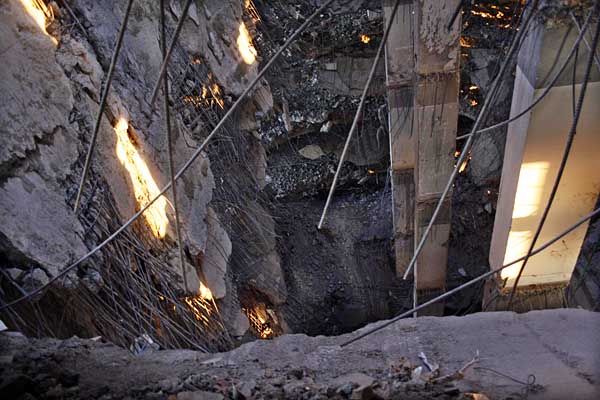 Collapsed floor of Rangs Building. December 9. 2007 ? Munir uz Zaman/DrikNews
Collapsed floor of Rangs Building. December 9. 2007 ? Munir uz Zaman/DrikNews
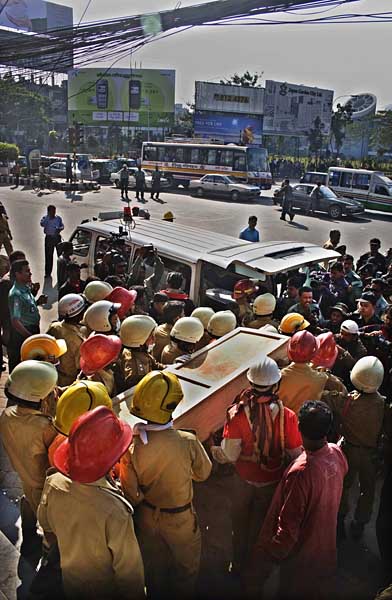 Body released by Fire Brigade being sent to morgue. ? Azizur Rahim Peu/DrikNews
Body released by Fire Brigade being sent to morgue. ? Azizur Rahim Peu/DrikNews
We rushed as soon as we received the tip off, sneaking away from our workshop on “Investigative Journalism for Television.” Working our way round the devotees praying on Panthapath we rushed to the National Museum.
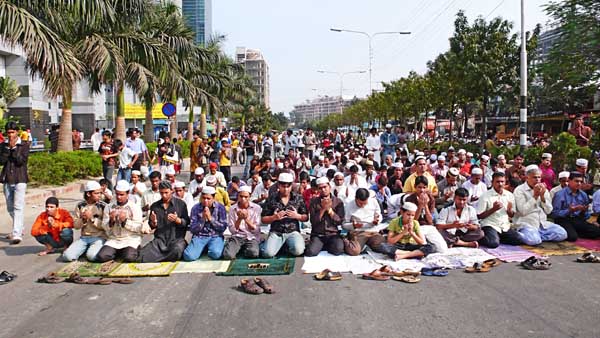 Jumma prayers on Panthapath. Friday December 7. 2007. ? Shahidul Alam/Drik/Majority World
Jumma prayers on Panthapath. Friday December 7. 2007. ? Shahidul Alam/Drik/Majority World
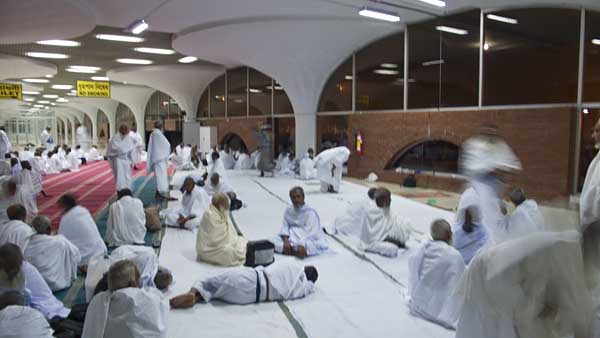 Hajis at Zia International Airport. Saturday December 8. 2007. ? Shahidul Alam/Drik/Majority World
Hajis at Zia International Airport. Saturday December 8. 2007. ? Shahidul Alam/Drik/Majority World
It was a false alarm. The trucks had left, and the artefacts that were still left in the National Museum were safe. At least for the moment. The remaining week, my book launch in Glasgow,
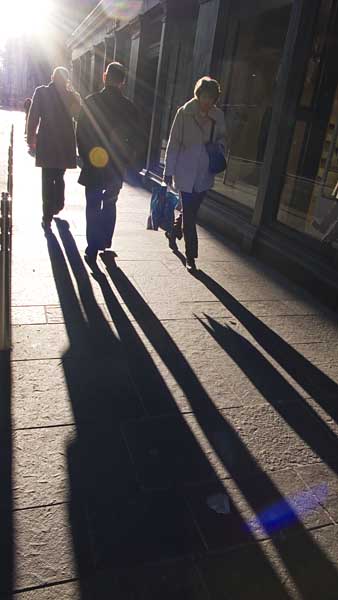 Glasgow. December 10 2007. ? Shahidul Alam/Drik/Majority World
Glasgow. December 10 2007. ? Shahidul Alam/Drik/Majority World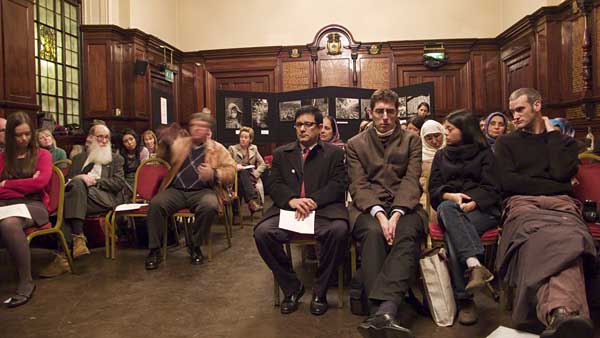 Glasgow. December 10 2007. ? Shahidul Alam/Drik/Majority World
Glasgow. December 10 2007. ? Shahidul Alam/Drik/Majority World
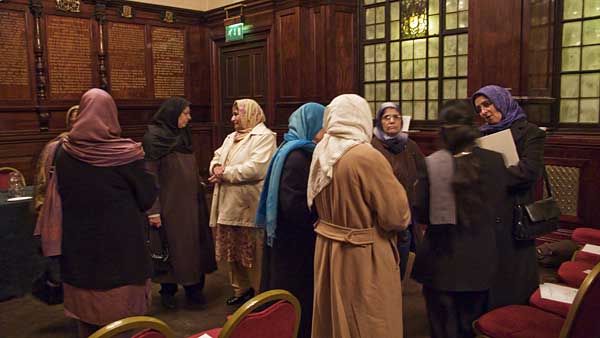 Glasgow. December 10 2007. ? Shahidul Alam/Drik/Majority World
Glasgow. December 10 2007. ? Shahidul Alam/Drik/Majority World
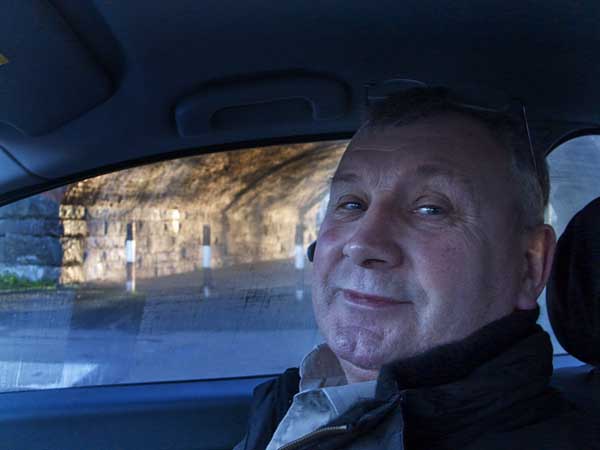 Taxi driver Robert who had worked at Port Glasgow. Ships later taken apart in Chittagong, Bangladesh, started their journey here. December 10 2007. ? Shahidul Alam/Drik/Majority World
Taxi driver Robert who had worked at Port Glasgow. Ships later taken apart in Chittagong, Bangladesh, started their journey here. December 10 2007. ? Shahidul Alam/Drik/Majority World
the Prince Claus Fund Award ceremony in Amsterdam and the conference “Visible Rights” at Harvard, took me from a sunny afternoon in Scotland to the snow covered streets of Cambridge.

Though Jon Husband had helped me setup my blog, I had never met him before. Jeroen picked me up at Schipol, and Jon, Jeroen and I had dinner at the Bazar Middle Eastern restaurant in Amsterdam. December 10. 2007. ? Shahidul Alam/Drik/Majority World
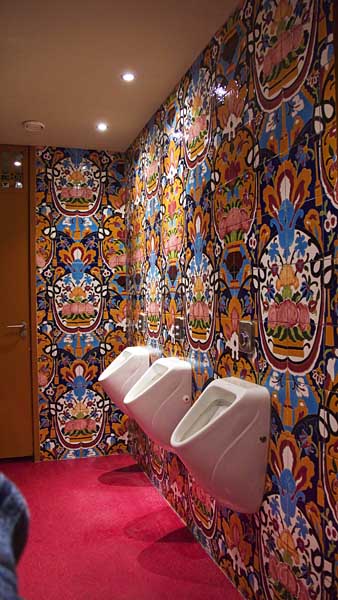 The ornate loo at the Bazar Middle Eastern restaurant in Amsterdam. December 10. 2007. ? Shahidul Alam/Drik/Majority World
The ornate loo at the Bazar Middle Eastern restaurant in Amsterdam. December 10. 2007. ? Shahidul Alam/Drik/Majority World
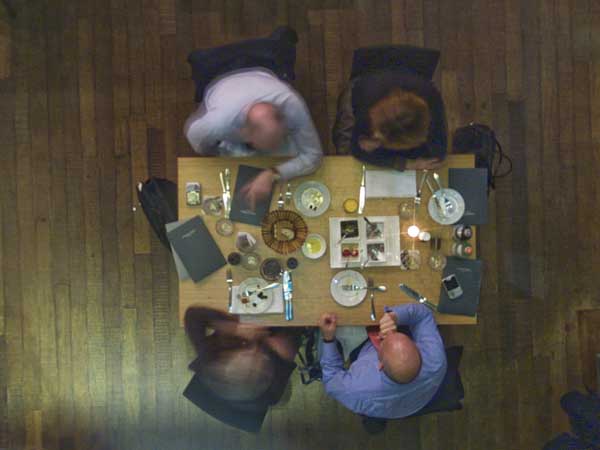 Diners seen through the glass floor at Muziekgebouw. Amsterdam. Dec 12. 2007. ? Shahidul Alam/Drik/Majority World
Diners seen through the glass floor at Muziekgebouw. Amsterdam. Dec 12. 2007. ? Shahidul Alam/Drik/Majority World
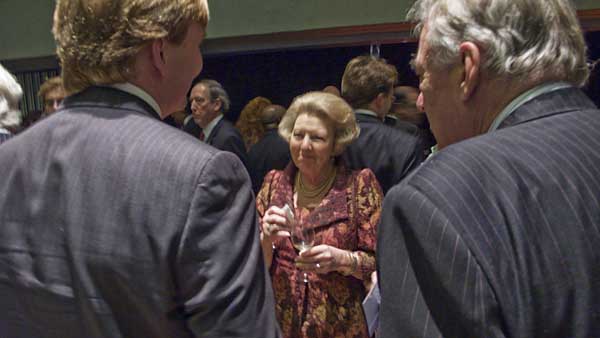 Queen Beatrix at Prince Claus Fund Award Ceremony at Muziekgebouw. Amsterdam. Dec 12. 2007. ? Shahidul Alam/Drik/Majority World
Queen Beatrix at Prince Claus Fund Award Ceremony at Muziekgebouw. Amsterdam. Dec 12. 2007. ? Shahidul Alam/Drik/Majority World
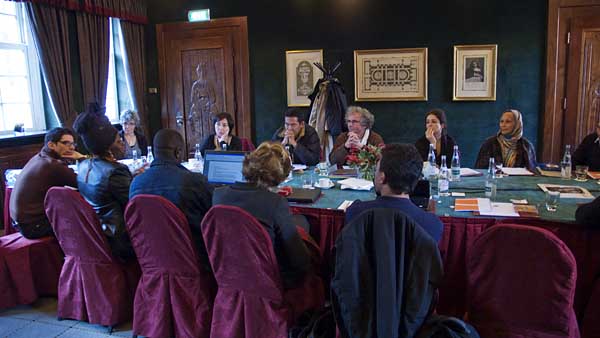 Network meeting of Prince Claus Fund at Grand Hotel, Amsterdam. December 13th 2007. ? Shahidul Alam/Drik/Majority World
Network meeting of Prince Claus Fund at Grand Hotel, Amsterdam. December 13th 2007. ? Shahidul Alam/Drik/Majority World
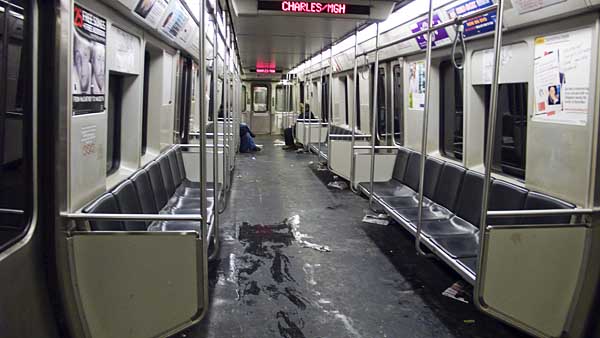 Train at Boston December 14. 2007. ? Shahidul Alam/Drik/Majority World
Train at Boston December 14. 2007. ? Shahidul Alam/Drik/Majority World
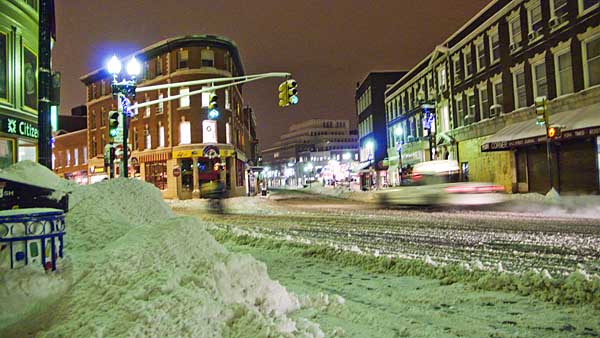 Outside Harvard train station at 2:00 am. December 14. 2007. ? Shahidul Alam/Drik/Majority World
Outside Harvard train station at 2:00 am. December 14. 2007. ? Shahidul Alam/Drik/Majority World
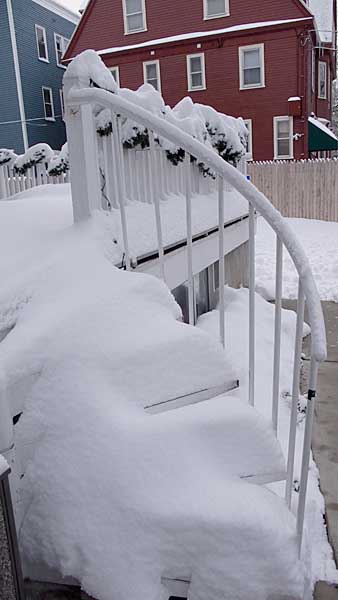 Stairs at Irving House. December 14. 2007. ? Shahidul Alam/Drik/Majority World
Stairs at Irving House. December 14. 2007. ? Shahidul Alam/Drik/Majority World
There was good news in between. The Rajshahi University teachers being released was a great relief, but the deaths of workers at Rangs Building, and the slum fire in Begunbari reminded me how far my own life was from the reality of workers and slum dwellers of my land.
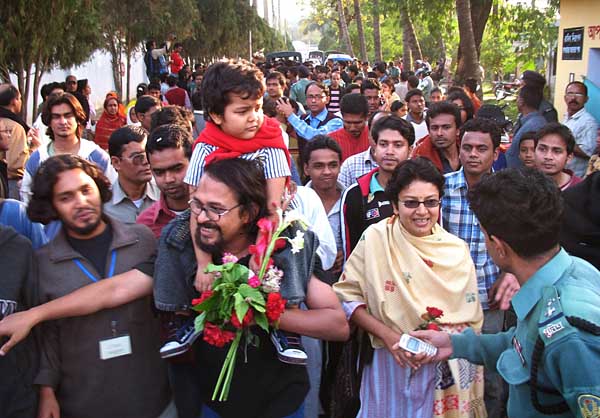 Detained Rajshahi University teachers, released after being granted a presidential pardon. December 10. 2007. ? Iqbal Ahmed/DrikNews
Detained Rajshahi University teachers, released after being granted a presidential pardon. December 10. 2007. ? Iqbal Ahmed/DrikNews
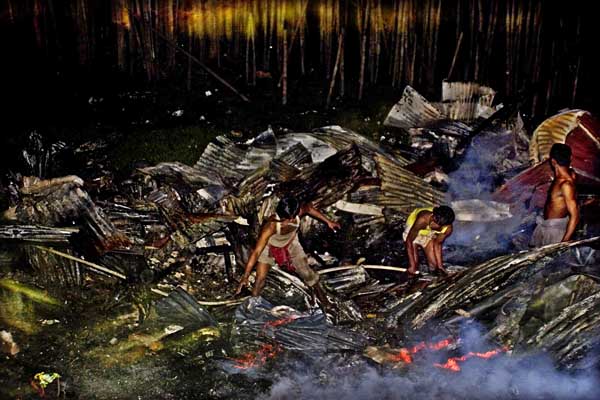 Fire in Begunbari slum. December 15. 2007. ? Zaid Islam/DrikNews
Fire in Begunbari slum. December 15. 2007. ? Zaid Islam/DrikNews
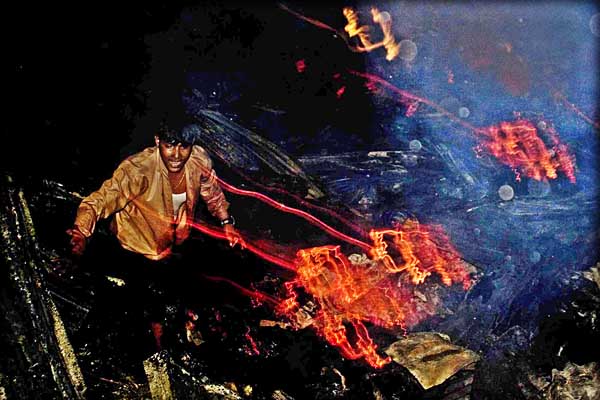 Fire in Begunbari slum. December 15. 2007. ? Zaid Islam/DrikNews
Fire in Begunbari slum. December 15. 2007. ? Zaid Islam/DrikNews
While the gatekeepers who rule our land remain untouched by the death of the poor. While media houses remain in the hands of wealthy business people. While opulent adverts by Grameen, Banglalink and Warid influence what gets reported in mainstream, the lives of media professionals like Priscilla Raj, Tipu Sultan, Probir Shikdar and Tasneem Khalil will continue to be under threat, The war criminals supporting the Pakistan Army had killed our intellectuals on the month of victory in 1971. December has another meaning for the workers and the slum dwellers who live under different military rulers.
Tag: Human rights
When the Waters Came
![]()
It was nearly twenty years ago when I had written this. After one of my first photojournalistic assignments:
What does one photograph to depict a flood? A submerged house, a boat on a highway, people wading in water?
As we boated through the branches in Jinjira we found a wicker basket in a tree. The family had long since abandoned their home, and their worldly belongings, gathered in that basket, waited patiently for their homecoming.

Wicker basket in tree. Jinjira. 2nd September 1988. Dhaka Bangladesh. ? Shahidul Alam/Drik/MajorityWorld
The worst flood in a hundred years? That statistic is hardly relevant. They, as those before them and after them will always face the floods. How does it matter whether they are 60% starved or 75% starved? How does it matter what country the relief wheat comes from? They themselves are mere statistics to power hungry politicians.

The family still needed to be fed. When I went back the next day to this place in Jinjira, the water had risen another three feet. I never saw her again. 2nd September 1988. Dhaka Bangladesh. ? Shahidul Alam/Drik/MajorityWorld
What is relevant are the feelings that have been kindled, that half kilogram of rice that has been shared, that solitary dry house that has warmly welcomed all who have needed the shelter. That others have shared the pain.
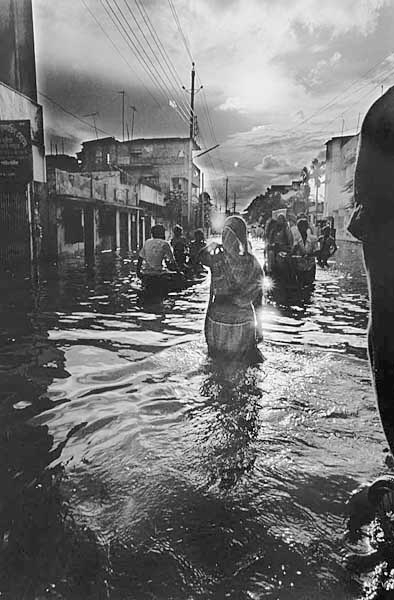
Wading down a street near Kamlapur railway station. “Dreamland Photographers”, the local studio, was still open for business. 2nd September 1988. Dhaka Bangladesh. ? Shahidul Alam/Drik/MajorityWorld
What is relevant is that now the roads are dry and the walls repainted and that a nation that once so cared has so quickly forgotten.
I look back and merely feel the ineffectuality of my images.
Shahidul Alam
Dhaka 1988
Nearly twenty years on, the floods are with us again. They are a part of our natural agricultural cycle. They irrigate the land, replenish the topsoil, remove the toxins. But deforestation in the mountains, illegal constructions, ill planned roads and ill caring leaders make floods take on a violent form. The waters get angry.
This year, when the waters had risen, our adviser advised that it was not yet a calamity. When the waters reached danger levels, the decree came that because of the state of emergency, ‘[political] banners were banned’ so while people struggled for food and shelter, banner rights became the issue. Now as the waters engulf the land and people flounder in need of relief, our adviser advises us ?we don?t have to help the people, they?re going to their relative?s house by themselves?.
Now that is a solution Bangladesh can offer to all the distressed people in the world. Just go find a relative.
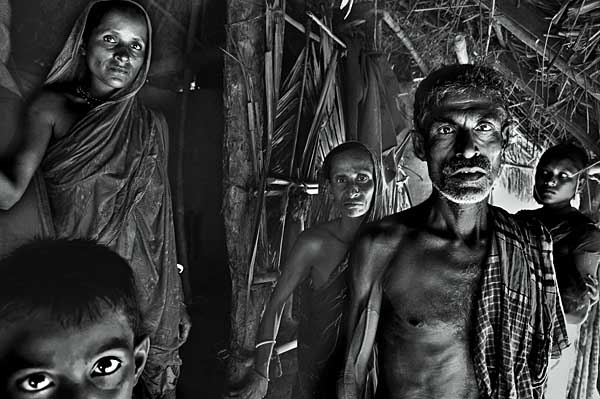
Before the floods. People affected by cyclone Akash. Mohishshoiri River. Khulna. 21 May 2007. ? Tanvir Ahmed/DrikNews
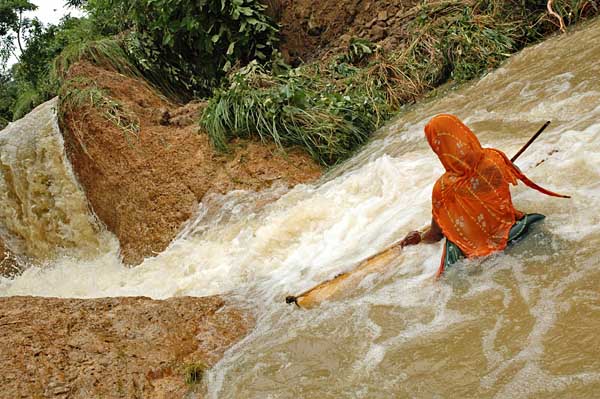
Woman fishes in the flood waters. 13 June 2007. Comilla Bangladesh. Kalim Shantu/DrikNews
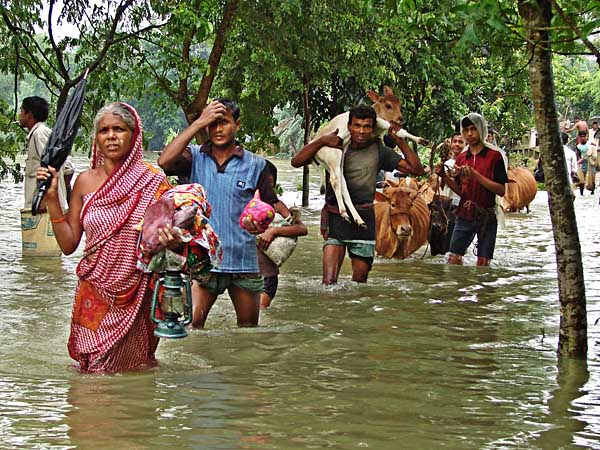
Twenty villages had been affected at the junction of the rivers Ghagot, Brahmaputra and Teesta making numerous people homeless. 31 July 2007. Gaibandha. Bangladesh ? Quddus Alam/DrikNews
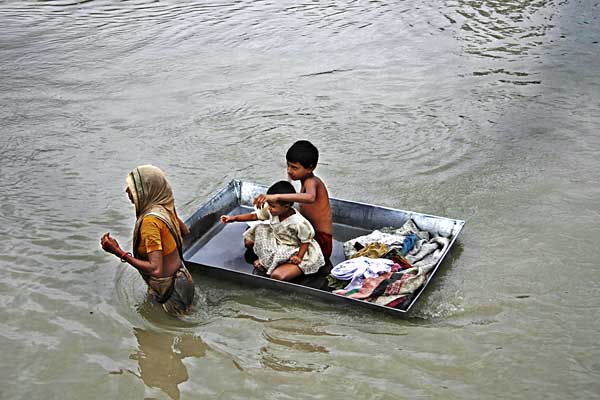
Woman in search of dry land. 30 July 2007. Sirajgonj Bangladesh ? Tanvir Ahmed/DrikNews
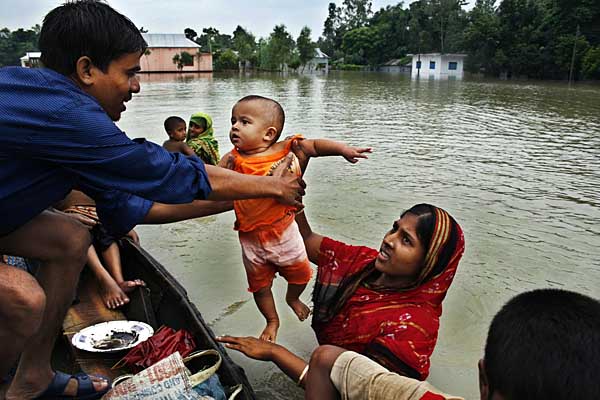
Villagers rescuing mother and child. 30 July 2007. Sirajgonj Bangladesh ? Tanvir Ahmed/DrikNews
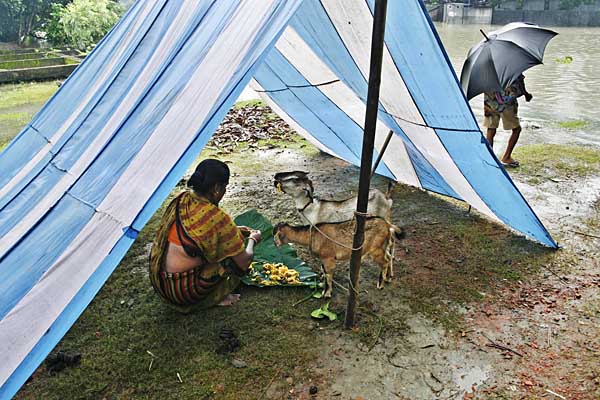
Woman feeding goats in makeshift tent. 30 July 2007. Sirajgonj Bangladesh ? Tanvir Ahmed/DrikNews
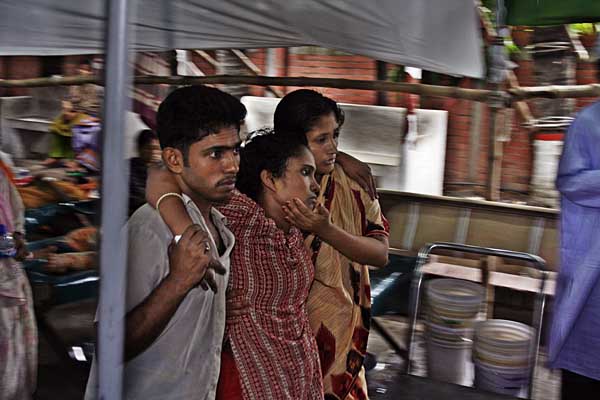
Diarrheal patients at hospital in Dhaka. 11 August 2007. Dhaka Bangladesh ? Munir uz Zaman/DrikNews
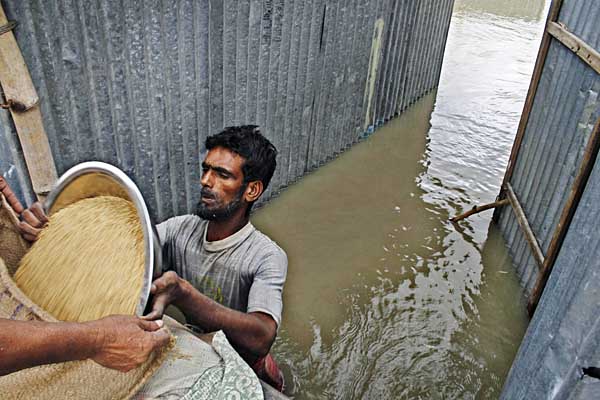
Spontaneous relief operations organised by citizen groups. 30 July 2007. Sirajgonj Bangladesh ? Tanvir Ahmed/DrikNews
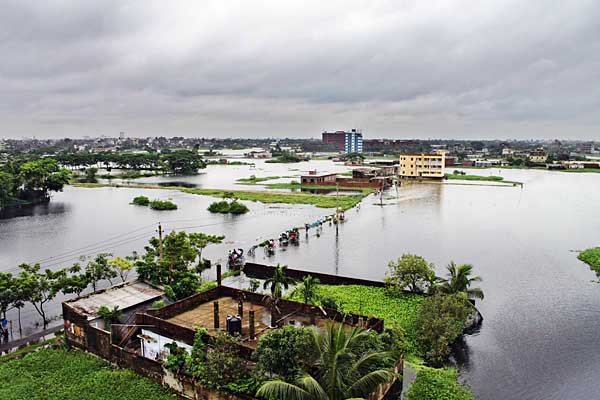
While one third of the country was flooded, people inside the DND (Dhaka Narayanganj Demra) embankment faced the stagnant water cause by rains. 25 July. Narayanganj Bangladesh ? Tanvir Ahmed/DrikNews
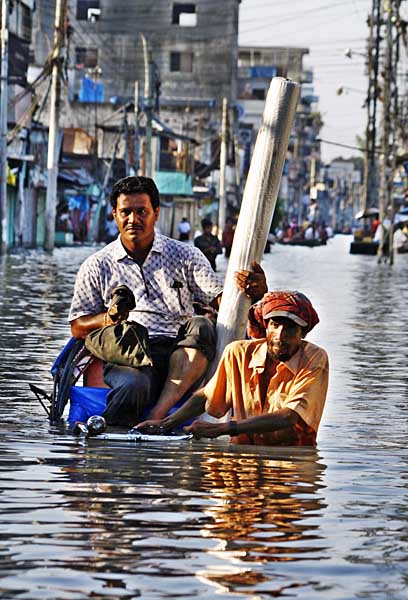
700,000 people were marooned in Sirajgonj. 64 people had already died when this photograph was taken. 5 August 2007. Sirajgonj Bangladesh ? Tanvir Ahmed/DrikNews
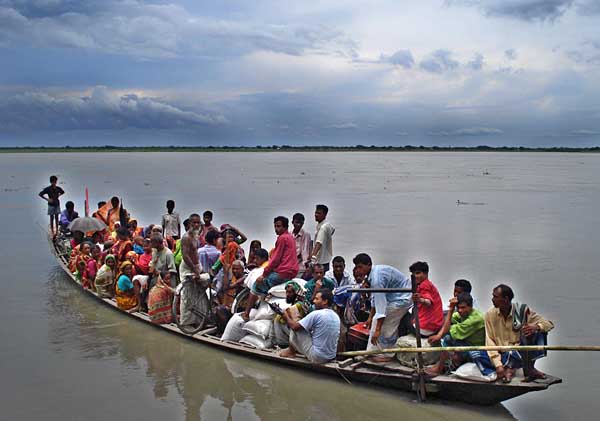
Boats are the only means of communication during floods. July 2 2007. Rangpur, Bangladesh. ? Ador Rahman/DrikNews
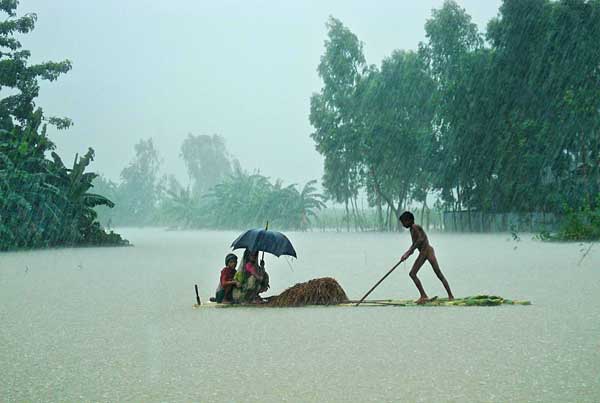
A family looks for shelter using a raft made of banana trees. 31 July 2007. Gaibandha Bangladesh ? Quddus Alam/DrikNews
And across the border, viewed from afar:
The Rains Reach Kolkata
When I was just a little boy, I watched the clouds advance
From rooftop high above the streets and bustle of Calcutta.
Up there, I watched the hawks soar high, and saw the palm fronds’ dance,
In wind that blew before the storm, and banged each window shutter.
It was in June, when summer’s heat had risen to its height,
That clouds approached, as though for war, advancing in a line,
Their heads held high, dark wall beneath — a fear-instilling sight,
With lightning streaks, and thunder-growls of warriors divine.
The sparrows, crows and pigeons fled, in haste to get away
And find refuge, as dust was blown from streets by gusts so strong
That palm trees bent, and tossed their heads, and back and forth did sway,
As leaves and clothes, and sailing fronds, with birds were swept along.
Then from the heat, we knew respite, as cool winds did descend
>From belly of the thunderhead, which bore a mist so fine,
With ions, whose electric charge did minds and bodies mend
And lift from summer somnolence like clear celestial wine.
And I would run and scramble down, from perch on highest roof,
To shelter in a doorway, where I still could watch the storm
Without myself being blown away, or struck by lightning hoof,
As racing clouds obscured the sky, like wraiths in equine form.
And then the dark, the greenish gloom, the flash more bright than sun,
The crack so loud it seemed the earth was cloven by the sky,
And pelting rain in slanting sheets, like bullets from a gun,
On roofs of tin, and wooden shades, and roll of thunder high!
And so the chariots of the gods would roll by overhead,
And we could hear the neighs and roars, and see the sparks that flew
As titans battled in the skies, by trumpet blowers led,
And sword of land pierced mail of sea, and blood of rain then drew.
And all the kids would venture out, unheeding of the scolds,
To jump with glee and leap and splash, in dance as old as time,
And yet as freshly bold that day, as in the eons old,
When sea would come to land to fight, and mate, in yearly rhyme.
Babui / Arjun Janah*
2007 August 11th, Sat.
Berkeley, California
*Arjun has an identity of his own, but for us photographers, he is the son of the legendary Indian photographer Sunil Janah.
The Trojan Horse
Standing in the grand parliament building in Karachi, built by his grandfather, veteran Pakistani MP Qamar Zaman reflected on the irony of it all. He had long campaigned against the militarization in Pakistan, but recent developments in Bangladesh worried Zaman. ?They saw what went wrong in the Pakistani experiment and decided to fine tune it? he lamented. The election commissioner in India, SY Quraishi, repeated the sentiment. Bangladesh following in Pakistan?s footsteps was not something he welcomed. Kunda Dixit, in Kathmandu, talked of how the same blueprint was being used in all our countries. Despite the rhetoric of democracy, the militarization of South Asian countries was the flavour of the day. Aided by chaotic situations created by political mismanagement, the anti-corruption Trojan Horse brought in its deadly military content.
As in Troy, the people had welcomed them with open arms. Years of mismanagement and corruption had worn down their patience. People wanted respite, regardless of where it came from. This was just the window the military needed. Not wanting to lose out on the lucrative UN placements, they needed a mask. The ?neutral? caretaker government was the perfect foil. The arrests of corrupt politicians, businesspeople and godfathers provided a much needed relief. Few worried about the flimsy, and sometimes concocted accusations used to reel them in. None dared to speak of the glaring omissions. Curbing media freedom took care of the main obstacle. The military or the Jamaat were strangely absent from the list. Amongst the largest and most controversial deals made during previous regimes were the MIG and the Frigate purchases. Yet neither had featured in the cases being investigated. ?kaker mangsho kak khai na.? (A crow doesn?t eat crow?s meat).
After much foot dragging, and over two months of delay, a one member body was asked to probe into the death of adivasi activist Choles Ritchil in the most gruesome killing while in military custody. The Shadarghat launch disaster, in contrast, had three separate investigation committees ordered to submit reports within 24 hours. Choles on the other hand had resisted a multimillion dollar deal to take over adivasi land. It was a different ball game.
Tasneem Khalil was one voice that they had not been able to silence. His incisive, well researched investigations flew against the culture of silence that prevailed. Mahfuz Anam, the editor of the leading English daily, The Daily Star, had proudly told me, ?In all these years, not a single story had been spiked.? That was some time ago. Things were different now. The story of military involvement that Tasneem had revealed was pulled back from the press in the last minute. A commentator on the roundtable at Drik on the 3rd May, International Press Freedom Day, had equated the Daily Star and the Daily Prothom Alo with a new political party. The newspapers had elaborate reporting on the US ambassador’s love for democracy and a free press. The Drik roundtable, featuring some of the bravest journalists working in the land, went unreported. The roundtable had discussed the military, the corporate deals taking place, the heavy hand of foreign countries. It talked of deals being pushed through in the absence of dissent. Tasneem had deliberately not been asked to speak. That would be inviting trouble.
That didn?t protect Tasneem for long. In my room in Shangri La Hotel in the early hours of this morning I received an SMS from a student. Tasneem had been picked up from his home. This is a risk that all journalists speaking against the?government are prepared to take, but given what Choles Ritchil went through, this arrest is more ominous. A suicide note for an epitaph is too likely an outcome to let the system take its course.
Shahidul Alam
Kathmandu
11th May 2007
From SAJA list:
Daily Star reporter (formerly with New Age), and CNN Dhaka stringer, Tasneem Khalil was
picked up by men in plain clothes @ midnight, claiming to be from
“Joint Forces”/Army.
Tasneem Khalil Picked Up By “Joint Forces”
CNN Reporter Picked Up
Tasneem’s Blog
Tasneem, We’ll Come Get You
http://salamdhaka.blogspot.com/
Human Rights Watch Issues Alert
Tasneem on Choles Ritchil Case
Tasneem on Modhupur
Tasneem quoted in Washington Post
Sabash Bangladesh!
Justice for Nurjahan
Photographs Shahidul Alam
Text Rahnuma Ahmed
It was reported in the papers as suicide. On 10 January 1993 Nurjahan, a woman in her twenties from a struggling peasant household from the Maulvi Bazar district of north-east Bangladesh, was found dead from poisoning at her parents’ house in the village of Chattokchara.
Nurjahan Begum, 7th among 9 daughters, had been married five years before the incident. However, her husband abandoned her and she returned home to live with her parents. Later, her parents arranged another marriage for her, but since polyandry is forbidden by Muslim law, it was necessary to discover whether her first marriage had been properly dissolved. Nujahan’s father consulted the village imam (religious leader), who declared that she was free to marry. However, he revoked this later and claimed that the marriage was illegal because the first still stood. A shalish (village council for settling disputes and trying offending villagers) met to judge whether Nurjahan and any of her family members had broken the law. The shalish found Nujahan guilty of fornication, on the grounds that she was still married to her first husband; after debating the punishment, it decided that 101 pebbles should be thrown at Nurjahan and her second husband.
Pebbles were preferred to stones since the intention, reportedly, was to shame the couple rather than hurt or kill them. Nurjahan’s parents were also to be punished; the shalish decreed that they should be beaten with a broom. Nurjahan was made to stand in a hole that was then filled, half burying her, to receive her punishment. As she did so a member of the shalish approached her and castigated her for the shame she had brought on her family. She was not fit to live and should kill herself. Nurjahan was found dead the next day.
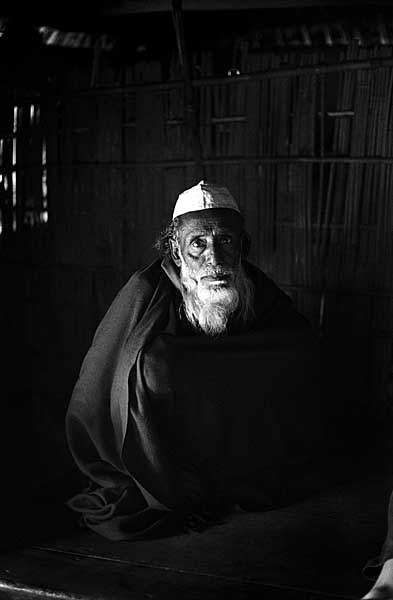
Nurjahan’s father
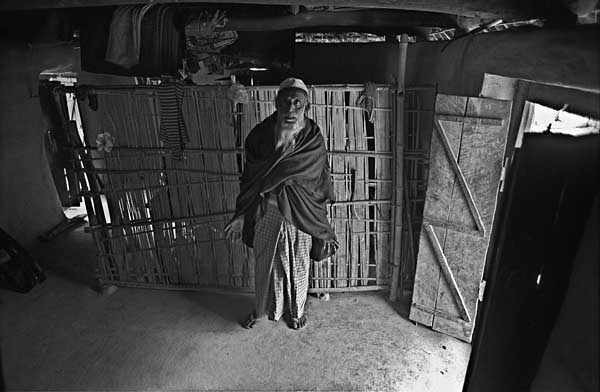
Nurjahan’s father: “This is where I found my daughter’s body.”
The affair was reported in a local newspaper. A campaign was launched by women’s groups to demand a criminal investigation into the circumstances of the death. Public outrage and the success of the campaign turned it into a landmark case;
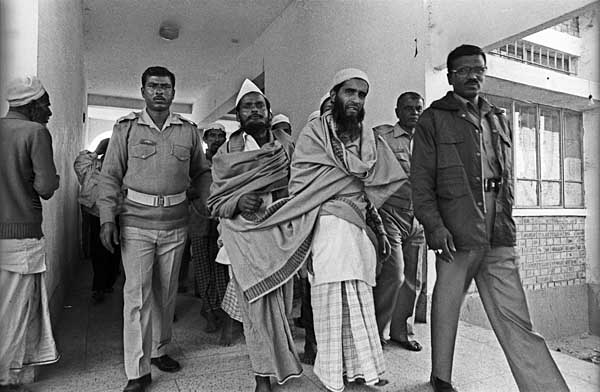
Accused being taken to Moulvibazar court
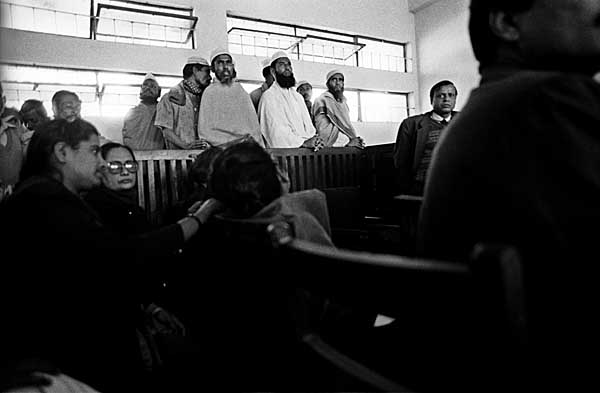
The accused in Moulvibazar court
proceedings were brought against the imam and the members of the shalish only a year after Nurjahan’s death. He and eight others were subsequently found guilty of abetting the suicide and received the maximum possible penalty of seven years’ hard labour. The village shordar (leader) died of illness while in custody.
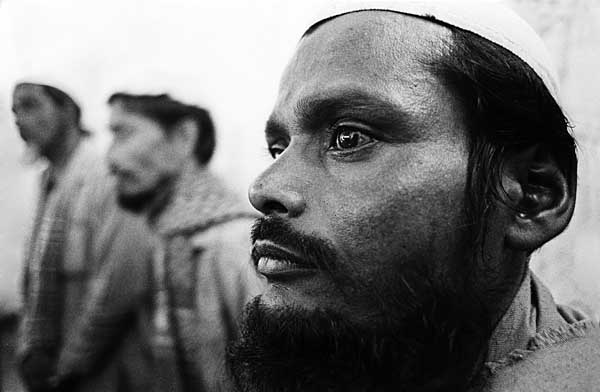
The accused in court jail.
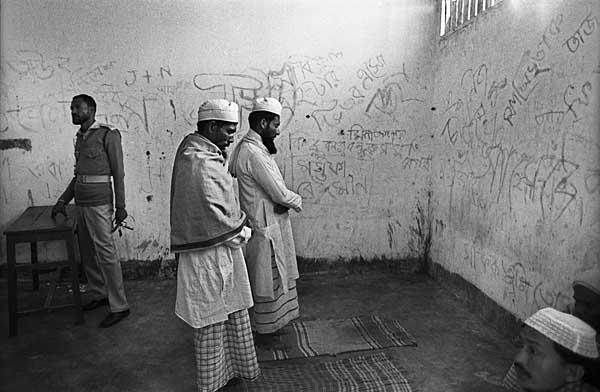
Imam leading prayers in court jail.
Nurjahan’s father believes that his family was made to suffer because of a long-standing enmity between him and the shordar. A female relative of the shordar spoke ill of Nurjahan. “She was a bad woman,” she said. “She would be seen working outside her home.” A rickshaw-puller from Chattokchara came to her defence. “Yes, she worked outside her home. But what other choice did they have?” he argued. “The family is poor.” But he did harbour some doubts. “Why was the wedding held secretly? Why were we not invited?”
Nurjahan’s death has raised many issues for the Bangladeshi women’s movement. Her tragedy has highlighted the manifold forms of women’s subordination within rnarriage, the family and within the community. First, Nurjahan was abandoned by her husband. Then it was the imam who held the knowledge about whether she was free to marry, and he misled her. Finally, it was the members of the shalish, all men, who judged and punished her.
Shalishes have been known to fine and discipline members of the community; at the same time, there are also instances of women disobeying or ignoring and, in some cases, challenging shalish pronouncements. Nujahan’s death has given rise to questions about the sphere of jurisdiction of the shalish, which is a community body with no legal status.
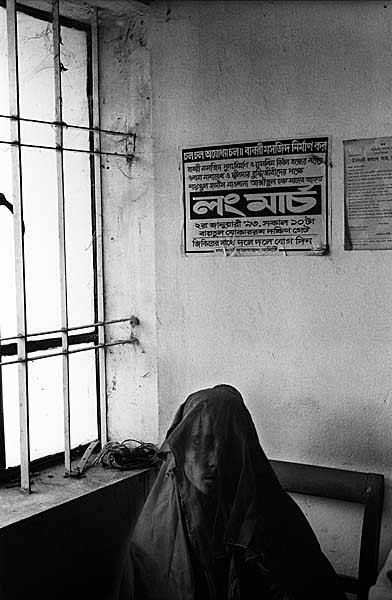
Wife of one of the accused, waiting outside courtroom.
There are few reminders of Nurjahan herself. Of her belongings, a torn corner of a shari, and a shawl she was wearing when she died, have been put aside. Her few remaining clothes were being worn by women in her family. Her only other belongings, a pot and two pans. were being used by her mother.
The family has no photographs. Her grave, like that of the shordar is a small clearing on a hillock near the village, scarcely recognisable as such. The district commissioner promised that the site will be named “Nurjahan tila”.
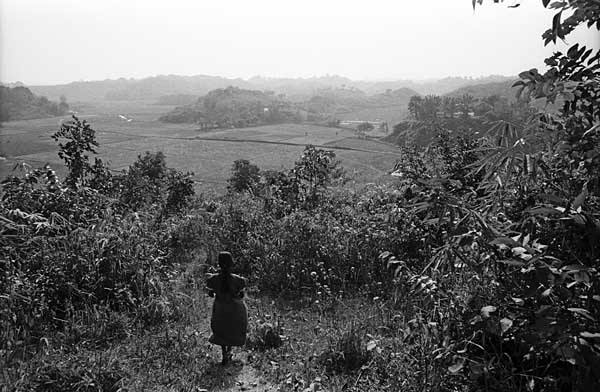
Nurjahan’s sister at her grave.
The government, in turn, announced that a road would soon be built to Chattokchara. However, in all likelihood, this is probably more significant for visiting journalists and officials, than for her family.
So Jamila could be Happy
![]()
Khala (auntie) was happy to see me. It was on impulse that I had gone to see her that day. I hadn’t seen her for a while and simply wanted to know how she was. She greeted me with her usual impish smile, but the smile had more to do with the fact that she had found a photographer in the house. Quickly she bundled me to the next room where a woman was holding a new born baby. Jamila had just been born, and Khala had found a photographer who could record this important moment.
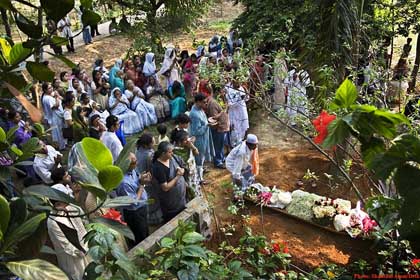
The mother was quiet, and after a few photographs, I left mother and daughter in peace. This was a child the mother knew she couldn’t afford to keep. It was back in the drawing room of that old Dhanmondi house that I saw Nasreen. She had come in through the garden, one of the few in Dhanmondi that the developers had not yet buried in concrete. We’d known each other for a long time, and along with her sister Shireen, had attended many rallies organised by Nari Pokkho, the womens group that they belonged to. On many a protest, I had become an honorary woman and a proud member of the group.
Her wild curly hair bouncing as she spoke, we talked of the work we were doing together on HIV/AIDS. Positive Lives, an exhibition I had worked on as a curator and a photographer, was a show Action Aid had been touring country wide. They had organised educational programmes and gotten local celebrities to draw the crowds in. It had been a hugely successful tour. We talked of the work they were doing with the acid survivors. Rattling off ideas at great speed, for me to pursue, she dashed back to the office. Breezing out as she had breezed in. It was later that I learned that Nasreen and her husband Choton, had adopted Jamila. From then on, it was Jamila who took centre stage in Nasreen’s life. But that was the last I saw Nasreen alive.
Choton and I were fellow journalists, and whenever an important statement needed to go to press, it was Choton I would turn to. From Press Club to Motijheel to Topkhana, we would do the night time beat. He knew every editor in town and which desk to leave the press release on. Sometimes it was in search of Choton, that I would call up Nasreen. We would talk of work, but invariably the conversation veered to Jamila, never accidentally.
When I heard of the accident, I hadn’t been too concerned. A leg injury inside the parking space didn’t sound too critical. But soon I sensed something was seriously wrong. All day long people gathered at the hospital. Ministers, celebrities, acid victims, friends, ordinary people. It was through their faces that I learnt how Nasreen had touched people’s lives. It was in their tears that I found how much love she had given. Some whispered in disbelief, some wailed out loud. Choton, Shireen and Zafrulla were distraught. Khala had not yet been told. Naila was like a rock. It was she who had to break the news. She knew Nasreen the fighter, was not going to win this one. Torn up inside, Naila kept calm. As I watched inside ICU 1, I could see our fighter losing the one fight she had never prepared herself for.
Reading her obituary in the Guardian today, I remembered that it was in the same ICU where we had kept vigil when Rashed Khan Menon had been shot. I had photographed another fighter Jahanara Imam, who had been waiting outside with us. Years later, Rashed Bhai had recovered, but I had written Jahanara Khala?s obituary in the Guardian. Police brutality and cancer had taken their toll. That day I had sat with Rahnuma next to where Khala had waited and quietly held hands. It rained, as it had done when my father died and for all the deaths I could remember.
Back in Dhanmondi, Friends had arrived from far away lands. People had come from the villages. We all stood in disbelief. As I walked out of that room heavy with sadness, I heard peels of laughter from the garden. Jamila, not sure of why her mother was not there, or why there were so many people, was playing with her friends.
Her mother was called ‘Happy’ by her friends. At her funeral in Ghazipur, Happy’s friends sang songs of remembrance. They spoke of her courage and her ability to love. They spoke of her tenacity. I thought of Jamila and remembered how Happy had changed the lives of so many others, and felt it was through Jamila’s laughter that Happy should be remembered.
Shahidul Alam
1st May 2006. Dhaka
Remaking Destiny
Subscribe to ShahidulNews
![]()
www.migrantsoul.org
Who am I? Where do I belong? Who determines my future? Society has no answer to these restless questions. Our sense of identity, kinship and community, are at worst shattered by the experience of migration and at best are thrown into uncertainty.
The universal declaration of human rights talks of a world “without distinction of any kind, such as race, colour, sex, language, religion, political or other opinion, national or social origin, property, birth or other status”. The reality, particularly for the economic migrant, is very different.
Physical, emotional, social and intellectual exclusion reinforce a migrant’s sense of displacement and alienation. The powerful may glide over such barriers, touching down for business, for pleasure or even out of guilt. For those without power, parting is painful, and each barrier crossed, like the ferry ghats of the big rivers, broadens the distance they must travel to return.
Expectations, dreams, duties and needs circumscribe the life of an economic migrant. The single hope, to change one’s destiny, is what ties all migrants together, whether they be the Bangladeshis who work in the forests of Malaysia, the bonded labourers in the sugarcane plantations in India, the construction workers in the Middle East or the hopeful thousands bound for the promised lands of Europe and North America. They see migration not merely as a means to economic freedom, but also as a passport for social mobility. The wealthy can purchase the future they desire. But a migrant who chooses to rewrite an inherited destiny swims against the current and faces the wrath of the gatekeepers who shape that destiny.
Shahidul Alam
Fri Jul 18, 2003
Changing their destiny
Subscribe to ShahidulNews
www.newint.org/issue287/contents.html
Letter from Bangladesh
Changing their destiny
Shahidul Alam travels with the poor who chase a dream to distant lands.
They all have numbers. Jeans tucked into their high-ankled sneakers. They strut through the airport lounge, moving en masse. We work our way up the corridors leading to the airplane, but many stop just before boarding. The cocky gait has gone. The sad faces look out longingly at the small figures silhouetted on the rooftops. They wave and they wave and they wave. The stewardess has seen it all before and rounds them up, herding them into the aircraft. One by one they disengage themselves, probably realizing for the first time just what they are leaving behind.

As in the case of the others, his had been no ordinary farewell. They had all come from the village to see him off. Last night, as they slept outside the exclusive passenger lounge, they had prayed together. Abdul Malek has few illusions. He realizes that on $110 a month, for 18 months, there is no way he can save enough to replace the money that his family has invested.
But he sees it differently. No-one from his village has ever been abroad. His sisters would get married. His mother would have her roof repaired, and he would be able to find work for others from the village. This trip is not for him alone. His whole family, even his whole village, are going to change their destiny.
That single hope, to change one’s destiny, is what ties all migrants together ? whether they be the Bangladeshis who work in the forests of Malaysia, those like Abdul Malek, who work as unskilled labour in the Middle East, or those that go to the promised lands of the US. Not all of them are poor. Many are skilled and well educated. Still, the possibility of changing one’s destiny is the single driving force that pushes people into precarious journeys all across the globe. They see it not merely as a means for economic freedom, but also as a means for social mobility.
In the 25 years since independence the middle class in Bangladesh has prospered, and many of its members have climbed the social ladder. But except for a very few rags-to-riches stories, the poor have been well and truly entrenched in poverty. They see little hope of ever being able to claw their way out of it, except perhaps through the promise of distant lands.
So it is that hundreds of workers mill around the Kuwait Embassy in Gulshan, the posh part of Dhaka where the wealthy Bangladeshis and the foreigners live. Kuwait has begun recruiting again after the hiatus caused by the Gulf War, and for the many Bangladeshis who left during the War, and those who have been waiting in the wings, the arduous struggle is beginning. False passports, employment agents, attempts to bribe immigration officials, the long uncertain wait.
Some wait outside the office of ‘Prince Musa’ in Banani. He is king of the agents. His secretary shows me the giant portraits taken with ‘coloured gels’, in an early Hollywood style. She carefully searches for the admiration in my eyes she has known to expect in others. She brings out the press cuttings: the glowing tributes paid by Forbes, the US magazine for and about the wealthy, the stories of his associations with the jet set. She talks of the culture of the man, his sense of style, his private jet, his place in the world of fashion.
Apart from the sensational eight-million-dollar donation to the British Labour Party in 1994 ? which Labour denies, but which the ‘Prince’ insists was accepted ? there are other stories. Some of these I can verify, like the rosewater used for his bath, and the diamond pendants on his shoes (reportedly worth three million dollars). Others, like his friendship with the Sultan of Brunei, the Saudi Royals and leading Western politicians, are attested to by photographs in family albums.
He was once a young man from a small town in Faridpur, not too distant from Abdul Malek’s home or economic position, who made good. Whether the wealth of the ‘Prince’ derives mainly from commissions paid by thousands of Maleks all over Bangladesh or whether, as many assume, it is from lucrative arms deals, the incongruity of it all remains: the fabulously wealthy are earning from the poorest of the poor.
Whereas the ‘Prince’ has emigrated to the city and saves most of his money abroad, Malek and his friends save every penny and send it to the local bank in their village. Malek is different from the many Bengalis who emigrated to the West after World War Two, when immigration was easier and naturalization laws allowed people to settle. Malek, like his friends, has no illusions about ‘settling’ overseas. He knows only too well his status amongst those who know him only as cheap labour. Bangladesh is clearly, irrevocably, his home. He merely wants a better life for himself than the Bangladeshi princes have reserved for him.
An old friend of the NI, Shahidul Alam is guiding light of Drik, a remarkable photographic agency in Dhaka.
